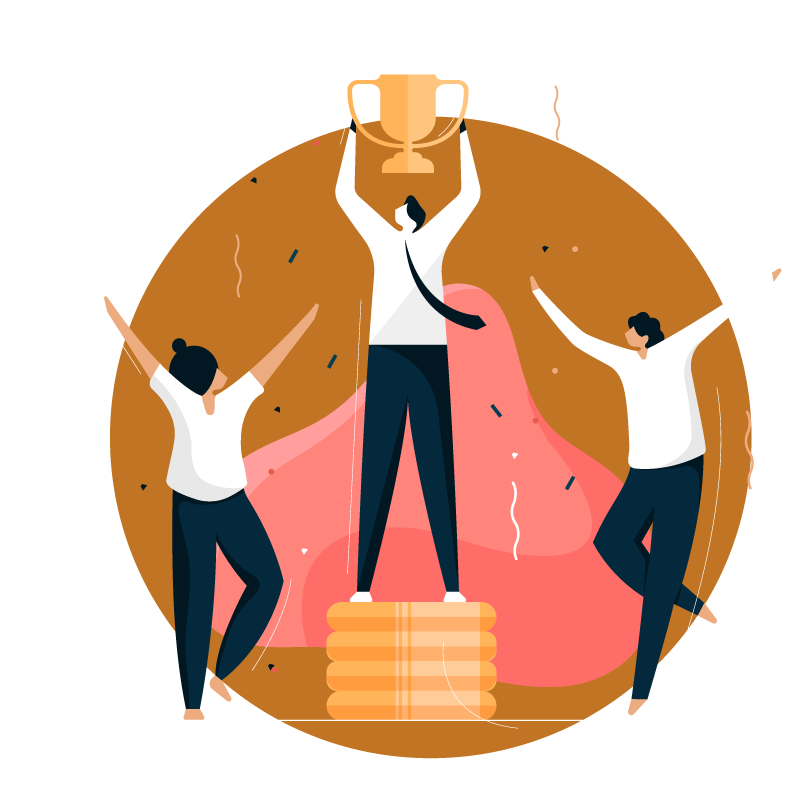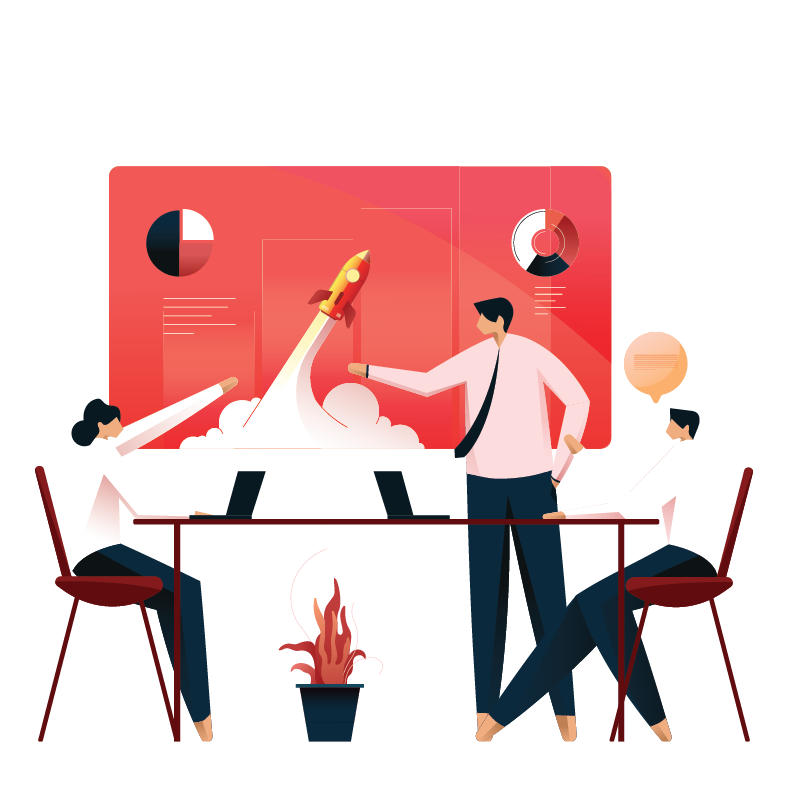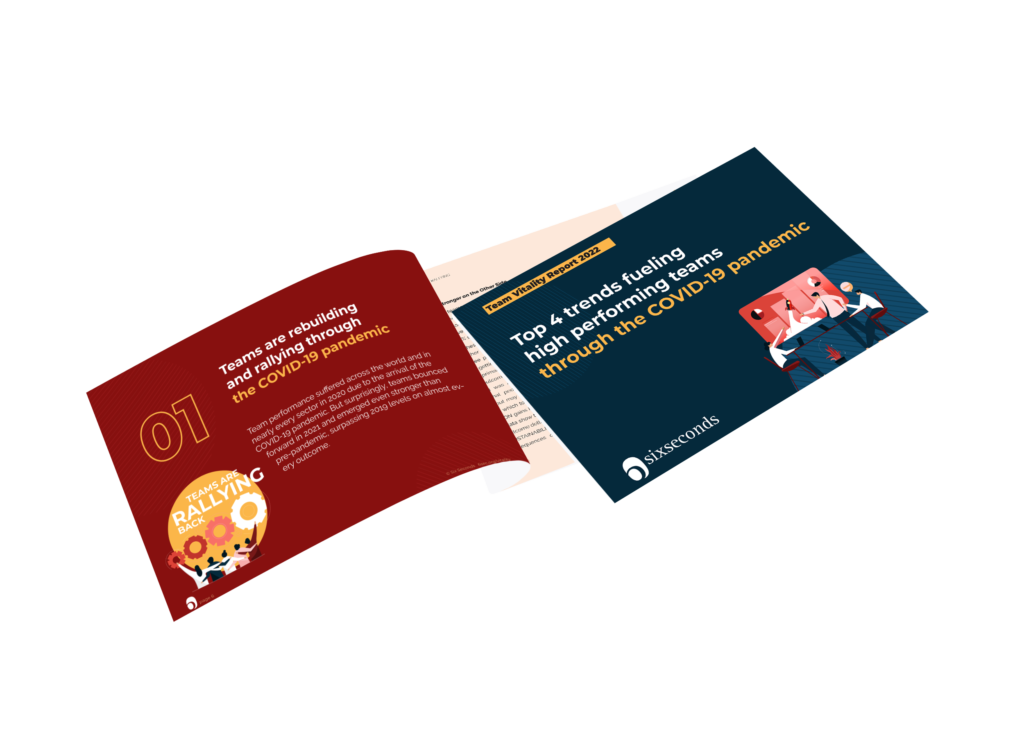3 Surprising Elements Fueled Top Performing Teams Through
COVID-19 Pandemic
New research reveals key drivers of top teams globally
In 2020, the COVID-19 pandemic presented unique challenges for work teams all over the world. Stay-at-home orders. Supply chain issues. COVID exposures and social unrest. Labor market volatility so intense it became known as The Great Resignation. Irrespective of country, industry or company size, most teams struggled. And all teams, to varying degrees, had to adapt, shift priorities, and experiment with new ways of working. These rapid changes and uncertainty also meant teams had to navigate unprecedented fear, anxiety and other complex emotions. Some navigated this chaos well; others not so much.
What separated top performing teams from everyone else?
The Workplace Vitality Report is a global research project that began in 2007, based on Six Seconds’ Vital Signs model and assessments. The 2022 edition focuses on teams (previous editions highlighted leaders and organizations) and how the COVID-19 pandemic impacted team performance globally. Because of the context in which this research occurred, it reveals some of the most powerful findings in the project’s history.
3 Powerful Predictors of Team Performance
What are these key elements that fuel top performing teams? Joy, trust, and celebration. These elements are not “extras” or simply “nice to have” – they are highly predictive of team performance across countries, industries, and company sizes. Further, since 2019, these three elements have become even more important each year, suggesting that they are especially critical in times of stress and uncertainty.
Depending on your age, where you live, and what industry you work in, these results may be surprising. Old-school management beliefs – still pervasive in organizations around the world – teach that it’s best to “leave emotions out of it,” and “be serious” at work. A growing body of research, however, suggests that the top performing teams globally take a different approach; the 2022 Vitality Report adds to this case. Instead of ignoring or suppressing emotions, the top teams leverage feelings as resources to gain a competitive advantage. Let’s look at the research behind these findings, starting with JOY:

1. Teams that experience JOY are more than 10x as likely to be high performing and satisfied with their work, per the 2022 Workplace Vitality Report. For context, cigarette smokers are 8x as likely to get cancer. This is a strong correlation, and one that has become even stronger since 2019. “In the last three years, emotions have become even more important predictors of performance,” says Six Seconds CEO Joshua Freedman. “During a time of distress and disruption, it’s easy to imagine that a joy-filled team offers its members something essential.”


2. Trust is at the heart of performance. The study found that TRUST predicted 72.53% of the variance in performance outcomes among individual team members – the highest of any of the 5 drivers in the Vital Signs model used in this research. This confirms research at Google about what fueled its top performing teams: psychological safety, or trust, is essential.

3. The key to sustainable success? Celebrate what worked – and what didn’t. Teams high in Celebration were 25x as likely to score high in Sustainability, or the ability to create enduring value. It’s about a culture of valuing learning; as Darwin (2017) reports, learning organizations get better results and time for reflection is key. In today’s fast paced environment, many teams struggle to prioritize celebrating success and learning from mistakes. There are too many meetings, emails and Slack messages to pause and reflect, but the new research shows that the emotional quality matters: A feeling of celebrating learning provides the energy to gain the insight teams need to launch even more successful ventures in the future.
To sum up the research: Teams that feel genuine joy, trust each other, and celebrate each other’s successes do best. While fun, connective and team building experiences have traditionally been used as rewards outside the day-to-day, this research suggests a different approach: Winning companies will build an emotionally intelligent culture where people like working together, feel safe, and enjoy learning. To learn more and get practical tips to apply immediately with your team, download the full report today:

2022 Workplace Vitality Report
Top 4 trends fueling high performing teams through the COVID-19 pandemic
The 2022 edition of the Workplace Vitality Report is here – focused on team performance at work, the impact of the COVID-19 pandemic, and what sets apart the highest performing teams. Here are four key findings, and a link to download the full report.
Features
What you’ll get:
✓ New global research on the impact of the COVID-19 pandemic on work teams and what fueled the top performing teams
✓ Expert analysis from the world’s largest organization dedicated to emotional intelligence
✓ Credible data from a validated psychometric assessment presented in visually engaging ways
✓ Practical tips and strategies to enhance climate, increase engagement, and boost performance with your team
SIX SECONDS
How to get involved:
Our mission is growing the world’s emotional intelligence.
We offer assessments, training and a community of experts with over 25 years experience.

Resources & eLearning
Learn emotional intelligence from the comfort of your home or office and be who you want to be.

Tools & Assessments
Explore Six seconds’ suite of validated emotional intelligence tools for individuals and groups.

Certification Courses
Jumpstart your personal or organizational growth by investing in emotional intelligence.

Events
Join us online or in-person to experience our diverse, committed community of change makers.

Case Studies
Read case studies of Six Seconds tools & methods transforming organizations for the better.

Partnerships
Long-term, impactful partnerships are central to achieving our mission. Will you join us?
- Emotional Intelligence at Work:In the Era of AI, What Happens to Human Skills? - November 19, 2024
- Fortifying the Mental Health of the Entire School Community with Emotional Intelligence - October 30, 2024
- Emotional Intelligence at Work: Exploring the Principles of Exceptional Leaders - October 15, 2024


I like this blog a lot. It is a very interesting subject. It really helps me figure out some problems. It has too many chances, and the way it works is very fast.